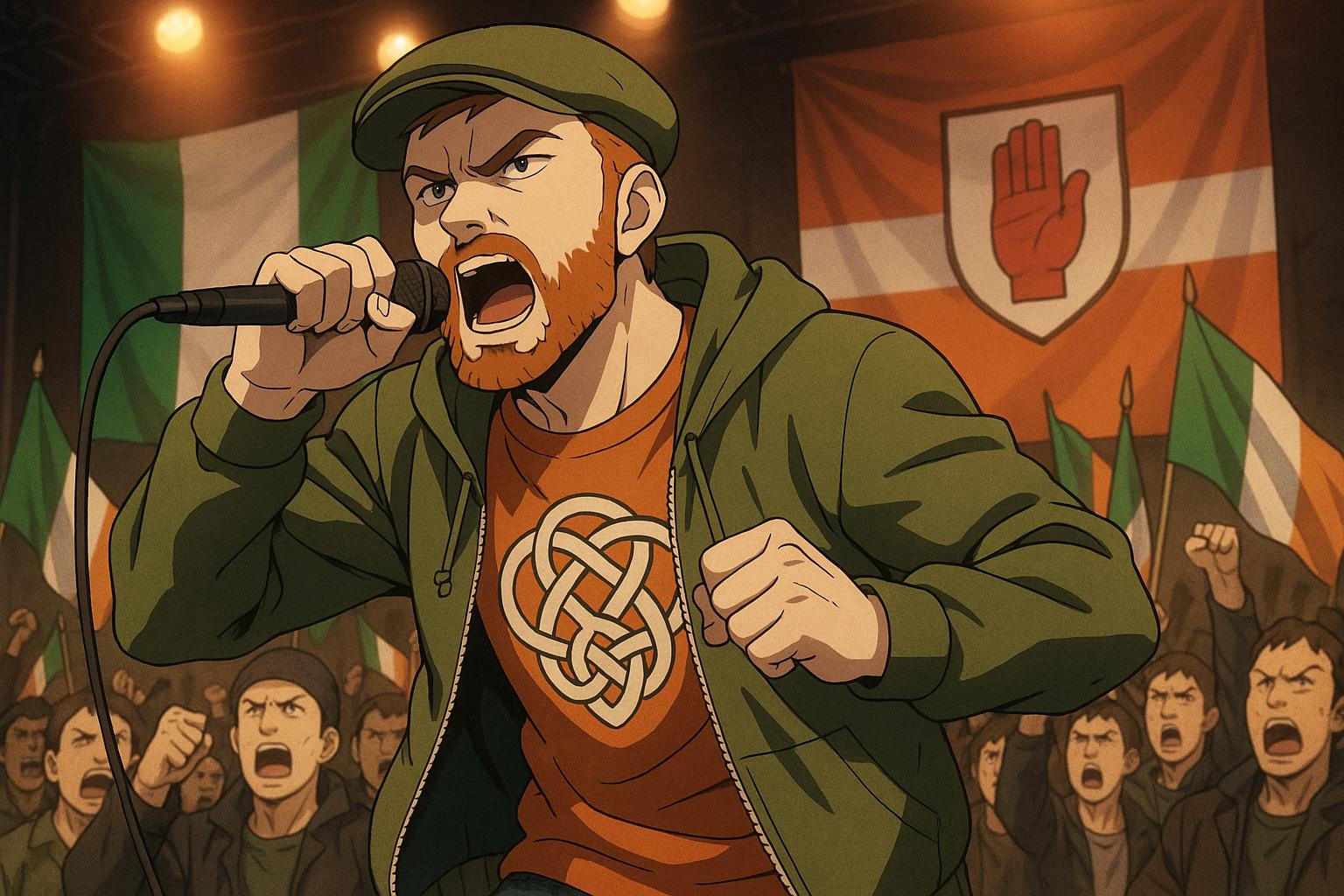Controversial Northern Irish rap group Kneecap has drawn significant media attention amid their provocative performances and ongoing legal issues. Last Thursday, they took to the stage at The 100 Club in London for a last-minute gig, encouraging a sold-out crowd to join in chants mocking former Prime Minister Margaret Thatcher while promoting pro-Palestinian sentiments. This latest event follows a turbulent period for the group, which has faced serious allegations, including a terrorism charge against one of its members.
The band's latest song, released just before their performance, took aim at Conservative Party leader Kemi Badenoch, mocking her attempts to restrict their access to arts funding and ridiculing the subsequent electoral defeats of her party. On stage, vocalist Mo Chara, who has been charged with displaying a Hezbollah flag at a separate gig, fervently engaged with the audience, accusing them of benefiting from police presence despite the lack of substantive action taken against what he referred to as a politically motivated investigation.
Kneecap’s controversial lyrics and performances are representative of a broader artistic tension between free expression and provocative political commentary. Founded in Belfast and primarily delivering their music in Irish, the group is known for its political messages, drawing parallels with prominent punk acts from previous decades. Their aggressive and confrontational style, however, has led to a string of concert cancellations and calls for boycotts, including from critics who liken their rhetoric to incitement.
The terrorism charge against Chara arises from allegations made by the Metropolitan Police, specifically related to an incident from November last year, where he reportedly displayed symbols linked to Hezbollah. This group is classified as a proscribed organisation in the UK. In their defence, Kneecap asserts that such representations were misconstructed and that the focus on their performances serves as a distraction from the political discourse surrounding global injustices, particularly the ongoing conflict in Gaza.
The escalating scrutiny around Kneecap has intensified following their appearances at major music festivals like Coachella, where they openly expressed support for Palestinian liberation, further fueling accusations of antisemitism from various political figures. In light of this, their performances have been scrutinised using audience recordings that have sparked investigations by counterterrorism authorities into the band's alleged endorsement of violence against UK lawmakers.
Kneecap’s narrative is underscored by the contrasting views of artists and lawmakers. While the group insists that their intent is to provoke thought and discussion around contentious issues, some politicians, including Shadow Secretary of State for Justice Robert Jenrick, argue that glorifying groups such as Hamas and Hezbollah should disqualify them from performing in public venues. Observers note a double standard in the public response—while the music scene often tolerates radical expressions, Kneecap's case appears to be handled with increased severity compared to other musicians who may express extremist sentiments from a different political perspective.
Despite the backlash, Kneecap's fierce dedication to Irish cultural expression and political critique continues to resonate with a portion of the public. Their stance on various issues reflects a complicated interplay between artistic freedom and societal norms, as they navigate an unpredictable landscape that balances between provocation, condemnation, and calls for solidarity with oppressed populations. As they prepare for their appearance at the Glastonbury Festival, the greater implications of their art as a form of protest against what they view as societal injustices linger, raising pertinent questions about the limits of artistic expression in today’s charged political climate.
As Kneecap straddles the divide between artistry and activism, their future will undoubtedly be shaped by ongoing legal challenges and political frosts, as well as by the audience's reception—an uncertain landscape for any artist seeking to make a profound statement in a world rife with division.
Reference Map:
- Paragraph 1 – [1], [3]
- Paragraph 2 – [1], [4]
- Paragraph 3 – [2], [6]
- Paragraph 4 – [1], [3]
- Paragraph 5 – [5], [7]
- Paragraph 6 – [6], [7]
- Paragraph 7 – [1], [2]
Source: Noah Wire Services
